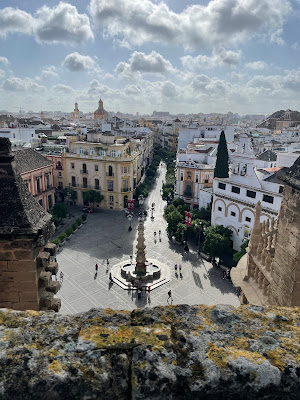At this time all the groups of the summer programs have gone to Andalusia and have received some notions of Spanish history.

Some of you have shown interest in the figure of Juana la Loca (Joanna of Castile), daughter of the Catholic Monarchs Isabella and Ferdinand. She is a tragic character, with a sad ending, which has given rise to a wide variety of novels, plays (the picture in black and white below shows the famous actress Margarita Xirgu playing the role of Juana), movies, but also academic research. Some historians have reviewed the official version and claim a parallel story where Doña Juana comes out better off.


That official version always presented a woman involved in a marriage of convenience to Felipe el Hermoso (Philip the Handsome, the only surviving son of the Holy Roman Emperor Maximilian ), mad with love for his infidelities and his early death. Historians, however, have been expanding and correcting some aspects of that perspective over the years. They remind us, for example, that her father, her husband and her son conspired to remove her from her rightful throne. Also, she died almost imprisoned by her own son in a palace in Tordesillas, what could aggravate or even cause her mental illness. Little by little, theories have also emerged about her "exagerated" reactions to her husband's betrayal, also related to the turbulent political situation in which she lived. Her mortal remains rest in Granada.
Our universal poet García Lorca (another essential character in our history, about whom I invite you to read at least on Wikipedia, to begin with), wrote a minor poem about her when he was 20 and had not yet written his best texts. The poem ends in this way (excuse my clumsy translation, please, the original is here):
Granada was your deathbed, Doña Juana,
the one with the old towers and the quiet garden,
the one with the dead ivy on the red walls,
that of the blue mist and the romantic myrtle
Princess in love and badly matched.
Red carnation in a deep and desolate valley.
The grave that keeps you oozes your sadness
through the eyes that it has opened on the marble.
You can also watch some movies about her:
LOCURA DE AMOR: https://www.imdb.com/title/tt0040544/?ref_=fn_al_tt_2
JUANA LA LOCA: https://www.imdb.com/title/tt0270480/
The first one is from the Franco era and is therefore full of hidden propaganda about his regime (linked to the "glorious" past of Spain).
The second one, filmed in 2001, won many awards.
Read me next week!












